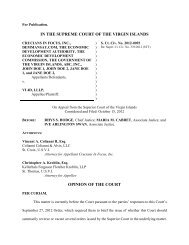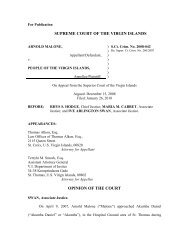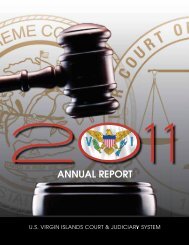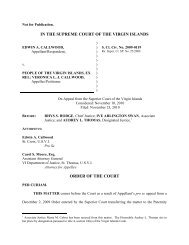IN THE SUPREME COURT OF THE VIRGIN ISLANDS OPINION OF ...
IN THE SUPREME COURT OF THE VIRGIN ISLANDS OPINION OF ...
IN THE SUPREME COURT OF THE VIRGIN ISLANDS OPINION OF ...
Create successful ePaper yourself
Turn your PDF publications into a flip-book with our unique Google optimized e-Paper software.
PERB et al v. UIW-SIUS. Ct. Civ. No. 2010-0099Opinion of the CourtPage 6 of 12jurisdiction,’ while a statute is ‘claims-processing’ if it ‘seek[s] to promote the orderly progressof litigation by requiring that the parties take certain procedural steps at certain specified times,’but do[es] not intend to limit a court's authority to hear a case.” First Am. Dev. Group/Carib,LLC v. WestLB AG, S.Ct. Civ. No. 2010-0084, 2011 WL 3489889, at *8 (V.I. July 26, 2011)(quoting Henderson v. Shinseki, 562 U.S. __, 131 S.Ct. 1197, 1202-03 (2011)). “The distinctionbetween jurisdictional and claims-processing rules, however, is not merely academic, for aclaims-processing statute may be equitably tolled or judicially modified, while failure to complywith a jurisdictional statute can never be excused” and such failure may be invoked at any stageof the proceedings, even sua sponte by the court. Id. (citing Bowles v. Russell, 551 U.S. 205, 214(2007)).To determine whether a requirement imposed by statute is jurisdictional or claimsprocessing,a court must consider whether that requirement “has long been understood to bejurisdictional.” Henderson, 131 S.Ct. at 1205. As this Court has repeatedly held, “[w]hen thetime to appeal or seek review is established by statute, timeliness is a jurisdictional issue“ and“therefore a petition filed out of time deprives the court of jurisdiction to entertain the appeal.”Pichardo v. Comm’r of Labor, 49 V.I. 447, 450 (V.I. 2008) (citing Bowles, 551 U.S. at 214). Seealso Mercer v. Bryan, 53 V.I. 595, 599 (V.I. 2010); Worldwide Flight Servs. v. Gov't of the V.I.,51 V.I. 105, 108-09 (V.I. 2009). However, we note that section 380 does not mandate dismissalas the remedy for an untimely petition for writ of review, but provides that “[a]n application notfiled in a timely manner shall entitle the prevailing party to summary judgment enforcing thefinal order of the PERB.” 24 V.I.C. § 380(a). In other words, section 380(a) appears tocontemplate that the Superior Court would continue to possess some adjudicative authority—albeit greatly circumscribed—with respect to a petition brought under section 380 even if it has
















